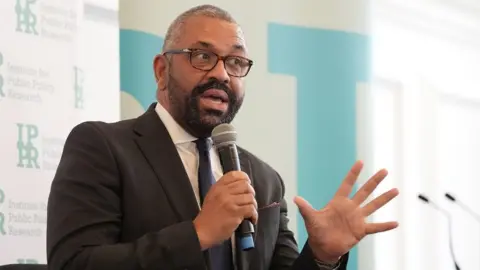In the political landscape of the United Kingdom, important transitions are unfolding in the Conservative Party, particularly under the leadership of Kemi Badenoch. Following a dismal showing in the previous general election and a drastic reduction in parliamentary representation, Badenoch is keenly interested in revitalizing the party’s presence. As part of her strategy to rejuvenate the shadow cabinet and recapture voter attention, she has initiated some reshuffling within her top team—her actions signaling both caution and clarity in the face of political challenges.
As Badenoch approaches the eight-month mark in her role as party leader, she recognizes the necessity of reforming her leadership team. The recent resignation of Edward Argar, who was shadowing the vital health secretary role, prompted Badenoch to seize the moment for change. His departure, due to health concerns, was an opportunity for her to not only fill an essential position but also to present a renewed front to the public just before the summer recess—a time when political narratives can shift dramatically due to the absence of parliamentary activity.
Perhaps one of the most notable appointments in this reshuffle is that of Sir James Cleverly, who returns to the Conservative front bench in a significant capacity. Cleverly is to shadow Angela Rayner, the Secretary of State for Housing, Communities, and Local Government, who also serves as the deputy prime minister. His appointment reflects Badenoch’s intention to tackle crucial housing issues head-on, showcasing her commitment to a robust stance within parliamentary debates and strategies regarding housing, one of the foremost concerns among voters today.
Cleverly’s reputation as a strong communicator will be vital as he navigates the complexities surrounding housing policy. His nuanced position within the party—ranked as a centrist Conservative—adds an interesting dynamic, especially as the party grapples with internal disagreements regarding issues like the European Convention on Human Rights. His voice is likely to carry weight in this ongoing debate, thus enhancing his importance within the restructured cabinet.
Accompanying Cleverly’s return are other key appointments, including Kevin Hollinrake, who takes on the Conservative Party Chairman role, and Stuart Andrew, who steps into the shadow health brief. Meanwhile, Mel Stride continues in his position as shadow chancellor. Notably, Robert Jenrick, who was a prominent contender in the previous leadership contest, retains his duties as shadow justice secretary, revealing Badenoch’s strategy to maintain experienced figures within her team who also have robust profiles within the party’s wider narrative.
Despite internal dynamics suggesting some ongoing competition within the ranks, Badenoch appears adept at handling questions regarding Jenrick’s ambitions. While he engages proactively with party matters—often leveraging social media for visibility—it is clear that the party needs to solidify its public image as it holds a significantly lower position in national opinion polls. The public requires coherent and compelling messages as the Conservative Party attempts to revive its fortunes in a landscape increasingly dominated by voter skepticism.
With speculation hinting at potential rivalries manifesting at the next Conservative conference, Badenoch must navigate these challenging waters delicately. However, she has already demonstrated an understanding of the importance of presence and visibility—two critical factors at this juncture in British politics. While her party may currently find itself struggling for popular support, the strategic reshuffling aims to restore some sense of dynamism and effectiveness, addressing the dire need for coherence in leadership and connectivity with the electorate.
In conclusion, having a reshuffled shadow cabinet with commanding names—such as Sir James Cleverly—brings an air of revitalization. It underscores Badenoch’s commitment to enhancing the party’s public narrative and engagement, crucial elements as she seeks to rejuvenate party fortunes in preparation for future electoral challenges. As she consolidates her team, the successes or failures of this endeavor will be closely scrutinized by allies and opponents alike.











